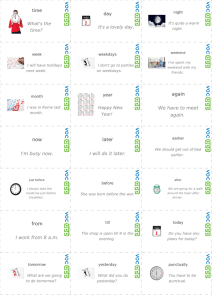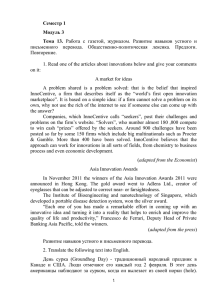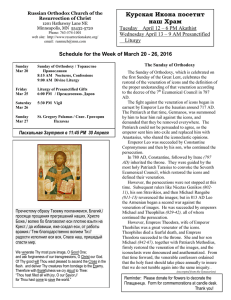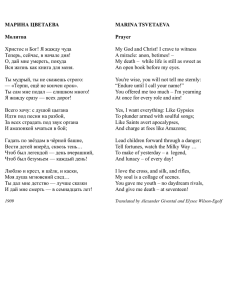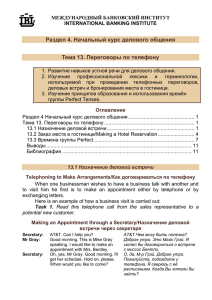Раздел 3 Начальный разговорный курс
реклама
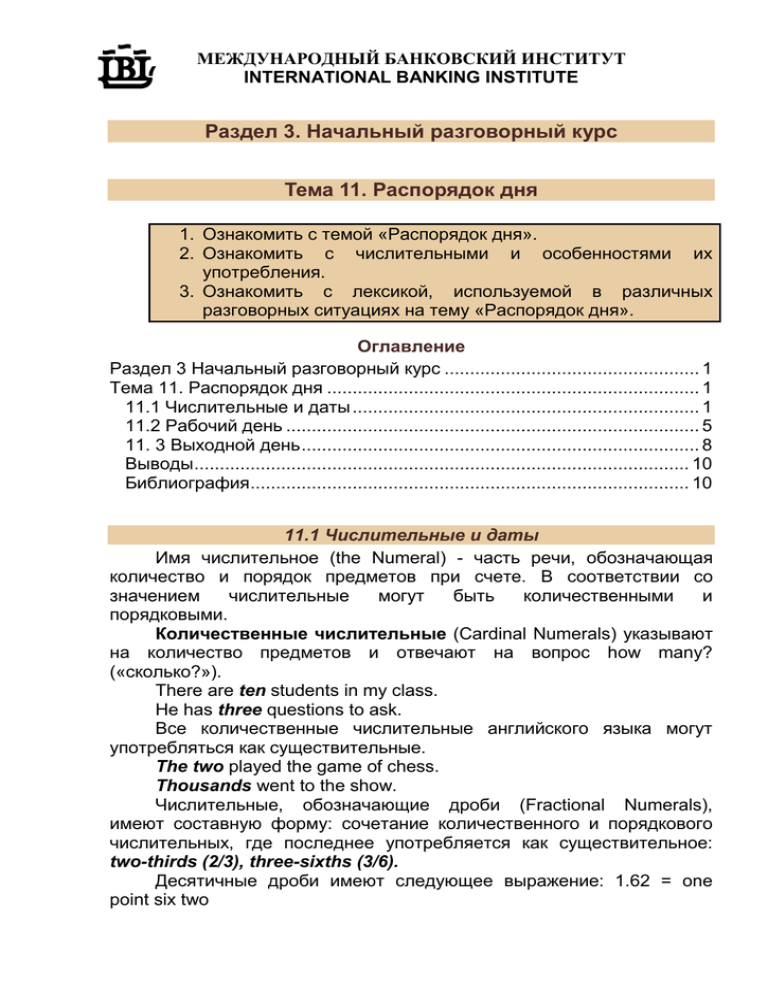
МЕЖДУНАРОДНЫЙ БАНКОВСКИЙ ИНСТИТУТ INTERNATIONAL BANKING INSTITUTE Раздел 3. Начальный разговорный курс Тема 11. Распорядок дня 1. Ознакомить с темой «Распорядок дня». 2. Ознакомить с числительными и особенностями их употребления. 3. Ознакомить с лексикой, используемой в различных разговорных ситуациях на тему «Распорядок дня». Оглавление Раздел 3 Начальный разговорный курс .................................................. 1 Тема 11. Распорядок дня ......................................................................... 1 11.1 Числительные и даты .................................................................... 1 11.2 Рабочий день ................................................................................. 5 11. 3 Выходной день .............................................................................. 8 Выводы ................................................................................................. 10 Библиография ...................................................................................... 10 11.1 Числительные и даты Имя числительное (the Numeral) - часть речи, обозначающая количество и порядок предметов при счете. В соответствии со значением числительные могут быть количественными и порядковыми. Количественные числительные (Cardinal Numerals) указывают на количество предметов и отвечают на вопрос how many? («сколько?»). There are ten students in my class. He has three questions to ask. Все количественные числительные английского языка могут употребляться как существительные. The two played the game of chess. Thousands went to the show. Числительные, обозначающие дроби (Fractional Numerals), имеют составную форму: сочетание количественного и порядкового числительных, где последнее употребляется как существительное: two-thirds (2/3), three-sixths (3/6). Десятичные дроби имеют следующее выражение: 1.62 = one point six two МЕЖДУНАРОДНЫЙ БАНКОВСКИЙ ИНСТИТУТ INTERNATIONAL BANKING INSTITUTE Примечание. Цифра 0 может иметь несколько форм в английском языке: 1. nought [no:t] используется в математике; 0.7 = nought point seven 07 = point nought seven 2. zero используется в науке, например, для обозначения температуры; -15 °С - minus fifteen degrees или fifteen degrees below zero 3. «о» используется в телефонных номерах: 01-500-30-26 = «о» one - five double о - three о two six 4. nil или nothing используется в спорте для обозначения счета игры: 2:0 = the score is two nothing или two nil Порядковые числительные (Ordinal Numerals) обозначают порядковое место предмета при счете и отвечают на вопрос which? («какой?», «который?»). Большинство порядковых числительных образуются путем прибавления суффикса -th к количественному числительному: sixth, seventh и т.д. Исключение составляют: first, second, third. Числительные million и thousand, если после них не следуют другие числительные, могут употребляться как в единственном, так и во множественном числе. Числительные hundred, thousand, million не имеют окончания -s, когда перед ними стоит другое числительное. Когда числительные обозначают неопределенное количество, они употребляются во множественном числе с окончанием -s, за которым следует предлог of. Сравните: two hundred books hundreds of books five thousand books thousands of books 2 million people millions of people hundreds of books two hundred books thousands of books five thousand books millions of people 2 million people Номера страниц, домов, квартир, транспорта, обозначаются не порядковыми, а количественными числительными. В этих случаях существительные употребляются без артикля: page 15, house 40, flat 3. Обозначения времени Если минутная стрелка (the long hand) находится в правой части циферблата (a face), используется предлог past: Десять минут двенадцатого. It' ten past eleven. МЕЖДУНАРОДНЫЙ БАНКОВСКИЙ ИНСТИТУТ INTERNATIONAL BANKING INSTITUTE Четверть двенадцатого. Половина двенадцатого. It' a quarter past eleven. It's half past eleven. It' ten past eleven. Десять минут двенадцатого. It' a quarter past eleven. Четверть двенадцатого. It's half past eleven. Половина двенадцатого. Если минутная стрелка находится в левой части циферблата, то используется предлог to. Без десяти двенадцать. It's ten to twelve. Без четверти двенадцать. It's a quarter to twelve. Без двадцати минут двенадцать. It's twenty minutes to twelve. Ровно одиннадцать. It is eleven sharp. It's ten to twelve. Без десяти двенадцать. It's a quarter to twelve. Без четверти двенадцать. It's twenty minutes to twelve. Без двадцати минут двенадцать. It is eleven sharp. Ровно одиннадцать. Время до полудня обозначается a.m. (от лат. ante meridiem), а после полудня p.m. (от лат. post meridiem). Например: 10 a.m. Десять часов утра 6 p.m Шесть часов вечера. Таблица количественных и порядковых числительных 1 (один) - one 2 (два) - two 3 - three 4 - four 5 - five 6 - six 7 - seven 8 - eight 9 - nine 10 - ten 11 - eleven 12 - twelve 13 - thirteen 14 - fourteen 15 - fifteen 16 - sixteen 17 - seventeen 18 - eighteen 19 - nineteen 1й (первый) - 1st - the first 2й (второй)- 2d - the second 3й - 3d - the third 4й - 4th - the forth 5й - 5th - the fifth 6й - 6th - the sixth 7й - 7th - the seventh 8й - 8th - the eighth 9й - 9th - the ninth 10й - 10th -the tenth 11й - 11th - the eleventh 12й - 12th - the twelfth 13й - 13th - the thirteenth 14й - 14th - the fourteenth 15й - the fifteenth 16й - the sixteenth 17й - the seventeenth 18й - the eighteenth 19й - the nineteenth МЕЖДУНАРОДНЫЙ БАНКОВСКИЙ ИНСТИТУТ INTERNATIONAL BANKING INSTITUTE 20 - twenty 30 - thirty 40 - forty 50 - fifty 60 - sixty 70 - seventy 80 - eighty 90 - ninety 100 – one hundred/ a hundred 200- two hundred 1 000 000 миллиард 133 201 1000 1287 5901 20й - the twentieth 30й - the thirtieth 40й - the fortieth 50й - the fiftieth 60й - the sixtieth 70й - the seventieth 80й - the eightieth 90й - the ninetieth 100й - 100th - the hundredth 200й - 200th - the two hundredth one million billion one hundred and thirty- three two hundred and one one thousand one thousand two hundred and eighty seven five thousand nine hundred and one Какое сегодня число? Сегодня первое января. Сегодня второе февраля. Сегодня третье марта. Сегодня четвертое апреля. Сегодня пятое мая. Сегодня шестое июня. Седьмого июля. Восьмого августа.. Девятого сентября Десятого октября. Одиннадцатого ноября. Двенадцатого декабря. What is the date today? It is the first of January today. It is the second of February today. It is the third of March today. It is the fourth of April today. It is the fifth of May today. It is the sixth of June today. On the seventh of July . On the eighth of August. On the ninth of September. On the tenth of October. On the eleventh of November. On the twelfth of December. Который час? Семь вечера. Половина восьмого утра. What time is it now? It is 7 o’clock p.m. It’s half past 7 a.m. or It is 7: 30 a.m. It’s a quarter to 7. It’s a quarter past 7. What time shall we meet? At 6 o’ clock. / At seven thirty. Без четверти 7. Четверть восьмого. Во сколько мы встретимся? В 6 часов. / В 7.30 Как читать даты? Числительное, обозначающее год, делится на две части - число сотен, а затем - число десятков и единиц. МЕЖДУНАРОДНЫЙ БАНКОВСКИЙ ИНСТИТУТ INTERNATIONAL BANKING INSTITUTE 1900 - nineteen hundred, in (the year) nineteen. Числительное, обозначающее год, делится на две части - число сотен, а затем - число десятков и единиц. 1900 - nineteen hundred, in (the year) nineteen hundred; 2000 - two thousand, in (the year) two thousand; 1905 - nineteen five, in (the year) nineteen five. Даты можно читать так: April 12, 2006 1) on the twelfth of April, two thousand six 2) on April the twelfth, two thousand six В английских деловых письмах дата (день, месяц, год) печатается справа. Обычно дата печатается полностью, а не в цифровом выражении, напр. 12 Apr. 2006. Названия месяцев можно писать в сокращении, кроме May. В американских деловых письмах дата пишется иначе, так как в США обозначается сначала месяц, затем день и год. Например: 2 сентября 2006 года в американском варианте лучше написать September 2, 2006. 11.2 Рабочий день Text 1. Read and translate the text. Hello. My name is Irina. I am a first-year student of the Faculty of Economics of the State University. My parents live in Novokuznetsk and I study in Saint Petersburg so I need some housing. There are two opportunities for me: I can live in a dormitory (a students hostel), or to rent a flat (an apartment). I decided to rent a room. To make the rent smaller, I also decided to share my room with another girl - Olga. She studies at the University, too, and she is my best friend now. Now, let me describe my usual working day. My classes begin at 8:30. So on week-days I have to get up at 7:15. I don't have an alarm clock and usually my roommate wakes me up and my working day begins. I turn on the radio and do my morning exercises while Olga takes a shower. I don't take a bath in the morning because I don't have enough time for it. I take a cool shower, brush my teeth. After that I go back to our room and get dressed. I brush my hair and put on a light make-up. Then we have breakfast. Olga makes breakfast every Monday, Wednesday and Friday. I have to serve breakfast on Tuesdays, Thursdays and Saturdays. I love to listen to the latest news on the radio while I am eating and Olga prefers light music. We leave the house around eight and walk to the nearest bus stop. We live rather close to the University and it usually takes us about ten-fifteen МЕЖДУНАРОДНЫЙ БАНКОВСКИЙ ИНСТИТУТ INTERNATIONAL BANKING INSTITUTE minutes to get there by bus. Sometimes when the weather is fine and we have enough time we walk to the University. It is very healthy to walk much. Our classes begin at 8.30 in the morning and they end at 6:00 p.m. We have lectures in different subjects. As a rule we have three or four classes a day. Sometimes it is very hard to wait till they end. Usually I don't miss my classes because I want to pass my exams successfully. But sometimes I do, especially when the weather is fine and the classes are boring. At one o'clock we have a big break. It lasts for half an hour. That's my favourite time. That is the time to share the latest news and to gossip. My friends and I prefer not to go to the canteen and we often have lunch in a small cafe not too far from the University. At one thirty we have to be back to our classes. During the working day we also have several short breaks that last for fifteen minutes. Occasionally I have to stay at the University till 6 or even 7 o'clock in the evening because I go to the library to get ready for my practical classes or to write a report. As a rule I have no free time on week-days. So by the end of the week I get very tired. When we come home in the evening, we have supper together and share the news. After supper we wash dishes, drink coffee or tea and watch TV. I prefer old comedies and Olga likes soap-operas or films about travelling. Sometimes Olga and I go for a walk in the park or visit our friends. At about eleven at night I go to bed. I like to read something before going to bed and Olga likes to listen to some music. Sometimes I fall asleep while I am reading. Key Vocabulary housing opportunity dormitory, students hostel to rent a flat (an apartment) to share week-days alarm clock usually roommate rather to turn on enough completely to get dressed make up to serve while жилье возможность студенческое общежитие снимать квартиру делить(ся) будние дни будильник обычно сосед по комнате довольно включать достаточно полностью, совершенно одеваться макияж обслуживать пока, в то время как МЕЖДУНАРОДНЫЙ БАНКОВСКИЙ ИНСТИТУТ INTERNATIONAL BANKING INSTITUTE to prefer предпочитать healthy здоровый, полезный to miss пропускать successfully успешно boring неинтересный, скучный to gossip болтать, беседовать, сплетничать have to be back должны вернуться break перерыв report доклад tape-recorder магнитофон to switch on = to turn on включать (радио и т.п.) to switch off = to turn off выключать to brush one's hair причёсывать волосы it takes me 10 minutes to get to the У меня уходит 10 минут, University by bus чтобы добраться в Университет на автобусе. cloackroom гардероб upstairs наверху, вверх по лестнице downstairs внизу, вниз по лестнице to miss classes пропускать занятия to pass exams сдать экзамены to get up at 7 o'clock вставать в 7 часов to have breakfast / lunch / dinner завтракать / обедать / ужинать to have smth for breakfast есть что-либо на завтрак to get to work by добираться до работы на It takes me half an hour to get to work. У меня уходит полчаса, чтобы добраться до работы. to deal with иметь дело с to be responsible for быть ответственным за to be in charge of быть ответственным за to count считать to go on business ездить в командировку to have regular meetings with регулярно встречаться с to finish work at заканчивать работу в to go shopping ходить по магазинам Text 2. I don't like week - days, because I have to get up early. My working day begins at 7 o'clock. I wake up at 7 but I don’t get up and stay in bed for extra 15 minutes. Then I get up, make my bed and sometimes I do my morning exercises. Then I wash, clean my teeth and if I have enough time, I take a shower. My wife works flexi-time, so usually she cooks meal and every morning she prepares breakfast for me. I don't like to eat much in the morning. As a rule I have a cup of tea or coffee with sandwich. After breakfast I put on my coat, take a bag and go to work. I leave for work about 8.20 a.m. It takes me 20 - 25 minutes to get to my office and in the morning I prefer to take a bus. МЕЖДУНАРОДНЫЙ БАНКОВСКИЙ ИНСТИТУТ INTERNATIONAL BANKING INSTITUTE My work begins at 9 o'clock. I work in a bank at the Loan Department. I am responsible for issuing business loans. During the day I have a lunch break from 1-2 p. m., and a couple of short breaks. I have a nine-to-five job, but very often I work overtime. I come home about 7 or 8 p.m. I have a little rest. Then I have dinner with my family. In the evening I watch the news on TV or some good film on video or discuss different things with my family. I go to bed at 11 o’ clock. Usually I am very tired, so I fall asleep very quickly. Key Vocabulary working day to wake up to get up (to rise) to do morning exercises to take a shower/bath wash (oneself) to comb to make the bed to cook meals week-days to wash up/to do the dishes to leave for work to take a bus/a tram/a trolley - bus to be in a hurry to have a rest to have a break for lunch to watch TV to go to bed at 8 (o'clock)sharp extra 15 minutes to do shift work to have a nine-to-five job to work flexi-time salary wage рабочий день просыпаться вставать делать утреннюю зарядку принять душ/ванну умываться причесываться убирать постель готовить пишу будние дни мыть посуду уходить на работу ехать на автобусе/трамвае, троллейбусе спешить отдохнуть иметь перерыв на ланч смотреть ТВ идти спать ровно в 8 часов лишние 15 минут работать посменно иметь нормированный рабочий день иметь свободный график работы зарплата служащего почасовая оплата, обычно неквалифицированного работника 11.3 Выходной день Text 3. Read and translate the text. Speak about your day-off. NICK'S USUAL DAY-OFF Hi, nice to meet you all! My name is Nick Price. I am a freshman at College of Business at Western Carolina University. I am not from North Carolina myself. I was МЕЖДУНАРОДНЫЙ БАНКОВСКИЙ ИНСТИТУТ INTERNATIONAL BANKING INSTITUTE born in Vermilion, Ohio, in the suburbs of Cleveland. But my grandpa and grandma live in North Carolina. And I like mountains more than plains. To cover some of the expenses I've got to work part-time on the campus. I work in cafeteria. Now let me tell you about my usual day-off. I have a roommate. His name is Mike. He is a football player. He jogs every morning at 6:30. On Weekends he doesn’t jog. I wake up at ten in the morning. First I take a cold shower and brush my teeth. Then I dress myself up and have breakfast. At 2 PM I eat lunch at cafeteria. The food is free for me because I work there. I am a vegetarian and I don't like drinks with caffeine. I prefer cool filtered water or juice. Then I meet my friends and we talk. On Saturday I play basketball with my friends. I swim once a week. I have dinner at 6 PM at the little Chinese restaurant not too far from the dormitory. Or I cook myself in the kitchen in my dorm. My favorite food is pizza and potato salad. After dinner I watch TV or play tennis with my friends. On Sunday we go to see the football game. Sometimes I spend my weekends visiting my grandmother and my grandfather. They are always glad to see me and take me out for picnics and golf. I usually read before I go to bed. It calms me down after the long day. My favourite author is Stephen King. Well, I guess that's enough for one time. See you later! Key Vocabulary day off freshman sophomore junior senior suburbs downtown cover some of the expenses to jog to rush campus cafeteria waiter to work part-time to work full-time properly to go out to calm down (at, on) weekend to relax выходной день первокурсник второкурсник третьекурсник четверокурсник(выпускник) пригород центр города чтобы покрыть часть расходов бегать трусцой,делать пробежку спешить, торопиться студенческий городок студенческая столовая официант работать неполный день работать полный рабочий день должным образом, правильно гулять, отдыхать успокаиваться) (в) выходные дни в конце недели расслабиться МЕЖДУНАРОДНЫЙ БАНКОВСКИЙ ИНСТИТУТ INTERNATIONAL BANKING INSTITUTE to have a rest to rest = to take a rest to enjoy oneself entertainment to throw a party birthday party house-warming party pastime to look forward to something to watch TV / video to listen to music to go to the cinema / theatre / club / disco opportunity отдохнуть, передохнуть отдыхать наслаждаться, получать удовольствие развлечение устроить вечеринку, пригласить гостей празднование дня рождения празднование новоселья времяпрепровождение с нетерпением ожидать чего-либо смотреть телевизор / видео слушать музыку ходить в кино / театр / клуб / на дискотеку возможность Выводы В результате изучения данной темы студенты получат знания и практические навыки, необходимые для описания распорядка рабочего и выходного дня, а также научатся правильно употреблять порядковые и количественные числительные. Библиография 1. Macmillan English Dictionary. London.2002. 2. Betty Schrampfer Azar. Fundamentals of English Grammar,Prentice Hall International, 1999. 3. К.Н. Качалова, Е.Е. Израелевич. Практическая грамматика английского языка, UNVES. Moscow. 2000.
